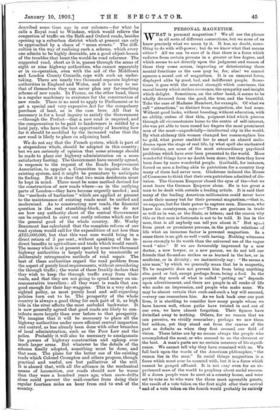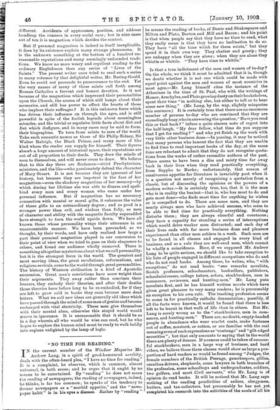PERSONAL MAGNETISM.
WHAT is personal magnetism ? We all use the phrase in all sorts of different connections, but we none of us know precisely what we mean by it. It has, no doubt, some- thing to do with will-power; but do we know what that means either ? All we can be sure of is that there is a force which radiates from certain persons in a greater or less degree, and which seems to act directly upon the judgment and reason of those they come across, improving or deteriorating these mental functions as the case may be, for, alas ! we cannot squeeze a moral out of magnetism. It is an unmoral force, displayed alike by good, bad, and indifferent people. Some- times it goes with the mental strength which convinces, the moral beauty which strikes reverence, the sympathy and insight which delight. Sometimes, on the other hand, it seems to be wholly divorced from the good, the true, and the beautifuL Take the case of Madame Humbert, for example. Of what we call " attractions," as distinct from magnetism, she had none. Without good looks, without breeding, without education, with no ability, unless of that thin, poignant kind which pierces through all circumstances home to the centre of self-interest, she was yet able to turn round her fingers the most prominent men of the most—superficially—intellectual city in the world. By what alchemy this woman changed her commonplace lies to gold, what power enabled her to enact an absurd melo- drama upon the stage of real life, by what spell she enchanted her victims, are some of the most extraordinary psychical problems which have ever been presented to the world. More wonderful things have no doubt been done; but then they have been done by more wonderful people. Garibaldi, for instance, forced on men a feeling akin to patriotism for a country they many of them had never seen. Gladstone induced the House of Commons to think that their own patriotism admitted of dis- union. The German Emperor closed the eyes of the—but we must leave the German mperor alone. He is too great a man to be dealt with outside a leading article. It is said that many of the leading American millionaires could never have made their money but for their personal magnetism—that is, we suppose, but for their power to capture men. Emerson, who knew his countrymen, says :—" There are geniuses in trade as well as in war, or the State, or letters; and the reason why this or that man is fortunate is not to be told. It lies in the man, that is all anybody can tell you about it." But apart from great or prominent persons, in the private relations of life what an immense factor is personal magnetism. In a sense there is no gift so well vorth having. Nothing witnesses more strongly to its worth than the universal use of the vague word " nice." If we are favourably impressed by a new doctor, a new lawyer, or a new parson, we do not tell our friends that So-and-so strikes us as learned in the law, or in medicine, or in divinity ; we instinctively say : " He seems a nice man," by which we generally mean that he is magnetic, To be magnetic does not prevent him from being anything else, good or bad, except perhaps from, being a fool. In the present day much of what is called "getting on" depends upon advertisement, and there are people in all ranks of life who make an impression, and people who make none. We may be almost certain that such-and-such a boy will succeed, —every one remembers him. As we look back over our past lives, it is startling to consider how many people whom we have known well, whose paths have twisted in and out of our own, we have almost forgotten. Their figures have dwindled away to nothing. Others, for no reason that we can perceive, we vividly remember; perhaps we saw them but seldom, yet they stand out from the canvas of the past. as definite as when they first crossed our field of vision. These latter are by no means always the people who accomplished the most, or who seemed to us the cleverest or the best. A man's parts are no certain measure of his signifi- cance. We cannot tell why they have remained with us. We fall back upon the words of the American philosopher, " the reason lies in the man." In social things magnetism is a force which must ever be counted. with, but it is a force which cannot be gauged offhand. It is not easy even for an ex-
perienced man of the world to prophesy about social success. If a dozen people were to meet at a country house, and were
set to vote as to who were the three most agreeable guests, the result of a vote taken on the first night after their arrival and of a vote taken on the fourth would probably be entirely
But if personal magnetism is indeed in itself inexplicable, it does by its existence explain many strange phenomena. It is the unknown something at the bottom of a hundred un- reasonable reputations and many seemingly unfounded tradi- tions. We know no more weary and repellent reading to the ordinary Englishman than any series of " Lives of the Saints." The present writer once tried to read such a series in many volumes by that delightful writer, Mr. Baring-Gould. Even he could not persuade to perseverance to the end. Yet the very names of many of these saints call forth among Roman Catholics a fervent and honest devotion. Is it not because of the magnetism which impressed their personalities upon the Church, the aroma of which still hangs about their memories, and still has power to affect the hearts of those who implore their suffrages ? It is this unknown force which has driven their influence on through the ages, and is still powerful in spite of the foolish legends about meaningless miracles, and the trivial or repulsive little facts about dirt and diet which disfigure, and in many cases may be said to form, their biographies. To turn from saints to men of the world. Take such romantic names as those of Sir Philip Sidney, Sir Walter Raleigh, the Black Prince, and many more of like kind whom the reader can supply for himself. Their figures absorb a huge amount of historical space, their reputations are out of all proportion to their deeds. They drew the minds of men to themselves, and will never cease to draw. We believe that to this day there are Scotsmen—strict Presbyterians, ministers, and the like—who passionately defend the character of Mary Stuart. It is not because they are ignorant of her history, but because they are impotent in the face of her magnetism—even the shadowy magnetism of her memory—by which during her lifetime she was able to disarm and spell- bind every man and every woman who came under her personal influence. But if magnetism has no necessary connection with mental or moral gifts, it enhances the value of those gifts to an extraordinary degree ; and as good is a stronger power than evil, and wisdom than folly, so men of character and ability with the magnetic faculty superadded have strength to turn the world upside down. We have all known those whose personality wings their utterance in an unaccountable manner. We have been persuaded, as we thought, by their words, and have only realised how large a part their personal magnetism played in our conversion to their point of view when we tried to pass on their eloquence to others, and found our audience wholly unmoved. There is something altogether mysterious about what we call personality, but it is the strongest force in the world. The greatest and most moving ideas, the great revolutions, reformations, and religious revivals, come to the world through great personalities.
The history of Western civilisation is a kind of Apostolic succession. Great men's convictions have more weight than their arguments. They sway rather than convince their hearers, they embody their theories, and after their deaths those theories have before long to be re-embodied, for if they are left to grow cold in books they soon become mere dead letters. What we call new ideas are generally old ideas which have passed through the mind of some man of genius and become recharged with vital electricity. These men give themselves with their mental alms, otherwise this stupid world would starve in ignorance. It is unreasonable that it should be so in a day wherein all who would be wise can read, but he who hopes to explore the human mind must be ready to walk boldly into regions unlighted by the lamp of logic.







































 Previous page
Previous page